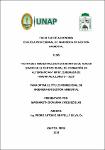| dc.contributor.advisor | Gratelly Silva, Pedro Antonio | |
| dc.contributor.author | Vasquez Blas, Margareth Giovanna | |
| dc.date.accessioned | 2024-03-01T13:01:19Z | |
| dc.date.available | 2024-03-01T13:01:19Z | |
| dc.date.issued | 2024 | |
| dc.identifier.other | 333.72 V32 2023 | |
| dc.identifier.uri | https://hdl.handle.net/20.500.12737/9864 | |
| dc.description.abstract | The purpose of the thesis was to evaluate the environmental attitudes of third-grade students at the Alternation Training Center No. 60167 in Tamshiyacu, Loreto in the year 2023. It is a quantitative research of a non-experimental, descriptive, analytical, transversal type. The primary information was obtained through the application of a structured census-type interview, related to the environmental attitudes of the students, descriptive and inferential statistics were applied with the Rho Spearman correlation test, which allowed reaching the following conclusions: The students have positive and diverse understanding of the environment, highlighting the importance of nature and the need to conserve it responsibly, they also have a strong sense of responsibility towards environmental protection. They demonstrate environmental concerns highlighting deforestation, waste management, the welfare of wild animals, water pollution and soil contamination and reducing anthropogenic environmental impact. They lack knowledge about renewable energies, but have the willingness and desire to participate. in cleaning or reforestation activities in their community. They acknowledge having received training in environmental issues and participate in activities on environmental issues and consider that environmental education will be useful in their lives. They segregate waste in their homes although some do not and the materials they recycle are plastic bottles, plastic bags, cans and organic matter. They reflect motivation and willingness to get involved in the protection and conservation of the natural environment and agree with the ban on single-use plastic products, such as bags or straws. They consider that water should be used responsibly. The correlation analysis allows us to reject the Null Hypothesis, because there is a significant correlation between environmental attitudes and learning factors. Students who show positive attitudes towards the environment have greater environmental participation and awareness. | en_US |
| dc.description.abstract | Se evaluó las actitudes ambientales de los estudiantes de tercer grado en el Centro de Formación en Alternancia N° 60167 en quebrada Tamshiyacu, Loreto en el año 2023. Es una investigación cuantitativa del tipo no experimental, descriptivo, analítico, transversal. La información fue obtenida mediante una entrevista estructurada tipo censo. Se aplicó estadística descriptiva e inferencial con la prueba de correlación de Rho Spearman, que permitió arribar a las siguientes conclusiones: Los estudiantes tienen comprensión positiva y diversa del medio ambiente, destacando la importancia de la naturaleza y la necesidad de conservarla de manera responsable, además tienen un fuerte sentido de responsabilidad hacia la protección el medio ambiente. evidencian preocupaciones ambientales resaltando la deforestación, la gestión de residuos, el bienestar de los animales silvestres, la contaminación del agua y la contaminación del suelo y reducir el impacto ambiental antrópico, Carecen de conocimiento sobre energías renovables, pero tienen la disposición y deseo de participar en actividades de limpieza o reforestación en su comunidad. Reconocen haber recibido formación en temas ambientales y participan en actividades sobre temas ambientales y consideran que la educación ambiental será de utilidad en sus vidas. Segregan residuos en sus hogares, aunque algunos no lo hacen y los materiales que reciclan son botellas plásticas, bolsas plásticas, latas y materia orgánica. Reflejan motivación y disposición para involucrarse en la protección y conservación del entorno natural y están de acuerdo con la prohibición de productos de plástico de un solo uso, como bolsas o pajitas. Consideran que se debe hacer un uso responsable del agua- El análisis de correlación permite rechazar la Hipótesis nula, porque hay una correlación significativa entre las actitudes ambientales y los factores de aprendizaje. Los estudiantes que muestran actitudes positivas hacia el medio ambiente tienen una mayor participación y conciencia ambiental. | es_PE |
| dc.format | application/pdf | es_PE |
| dc.language.iso | spa | es_PE |
| dc.publisher | Universidad Nacional de la Amazonía Peruana | es_PE |
| dc.rights | info:eu-repo/semantics/openAccess | * |
| dc.rights.uri | https://creativecommons.org/licenses/by/4.0/ | * |
| dc.subject | Gestión ambiental | es_PE |
| dc.subject | Actitud | es_PE |
| dc.subject | Sensibilización ambiental | es_PE |
| dc.subject | Estudiantes de secundaria | es_PE |
| dc.subject | Educación rural | es_PE |
| dc.title | Actitudes ambientales en estudiantes de tercer grado en el centro rural de formación en alternancia N° 60167, quebrada de Tamshiyacu, Loreto – 2023 | es_PE |
| dc.type | info:eu-repo/semantics/bachelorThesis | es_PE |
| thesis.degree.discipline | Ingeniería en Gestión Ambiental | es_PE |
| thesis.degree.grantor | Universidad Nacional de la Amazonía Peruana. Facultad de Agronomía | es_PE |
| thesis.degree.name | Ingeniero(a) en Gestión Ambiental | es_PE |
| dc.subject.ocde | https://purl.org/pe-repo/ocde/ford#5.07.01 | es_PE |
| renati.author.dni | 72198124 | |
| renati.advisor.orcid | https://orcid.org/0000-0002-1708-7101 | |
| renati.advisor.dni | 05220057 | |
| renati.type | https://purl.org/pe-repo/renati/type#tesis | es_PE |
| renati.discipline | 521236 | es_PE |
| renati.level | https://purl.org/pe-repo/renati/level#tituloProfesional | es_PE |
| renati.juror | Manrique del Águila, Julio Abel | |
| renati.juror | Yalta Vega, Ronald | |
| renati.juror | Ávila Fucos, Manuel Calixto | |
| dc.publisher.country | PE | es_PE |





